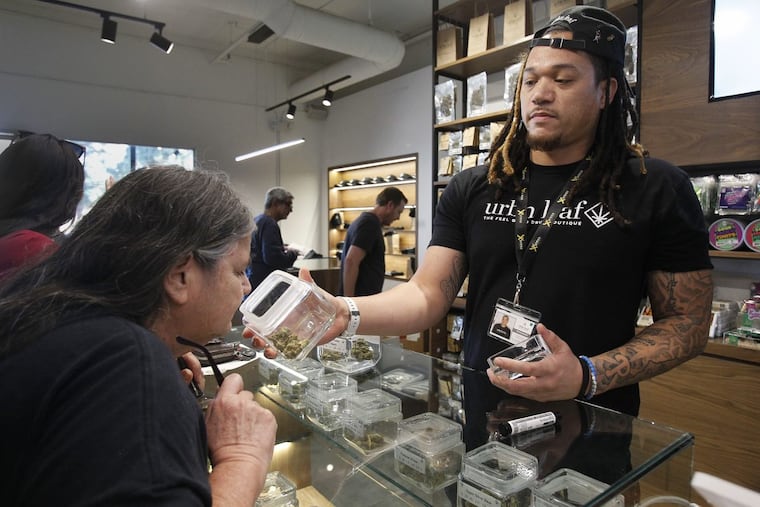For racial justice, legalized marijuana must be taxed correctly | Opinion
The smarter we are about the way we tax marijuana, the more we can reinvest in the communities that marijuana prohibition harmed.

In a “Twitter Townhall” before Christmas, Gov. Tom Wolf tweeted: “I think it is time for Pennsylvania to take a serious and honest look at recreational marijuana.” That announcement came as New York and New Jersey are in a race as to who will legalize recreational marijuana first.
Pennsylvania should legalize marijuana — in fact, it is overdue. The legalization of marijuana will not only end an ongoing injustice against people of color, but it will also provide an opportunity to amend some of the impacts of past policy. To do that, legalization needs to be done properly and in a comprehensive manner — including a thoughtful approach to how marijuana is taxed and where the revenues go.
The starting point of a conversation about marijuana legalization must be that prohibition failed in achieving its purported goal: preventing use. The number of people using marijuana nationwide is increasing. A study led by Columbia University researchers found that between 2001-02 and 2012-13, the number of people in America who reported using marijuana more than doubled from 4 percent to almost 10 percent. In Pennsylvania, more than 8 percent of adults admit to using marijuana regularly — roughly 800,000 people.
Even as more people use marijuana, the burden of prohibition falls on specific communities. In 2016, more than 20,000 people were arrested for marijuana possession charges in Pennsylvania, according to the Pennsylvania Uniform Crime Reporting System. More than 30 percent of those arrested were black, even though only 12 percent of Pennsylvanians are black, and it is well established that white and black people use marijuana at similar rates.
» Do you think marijuana should be legalized? Share your thoughts at opinion@philly.com. Please include your full name, location (neighborhood or town) and contact info. Some answers may appear in the Inquirer and on Philly.com.
This makes marijuana legalization above all a racial justice issue — meaning that any tax revenue from marijuana must be invested back in the communities of color that were harmed by prohibition.
That starts with making sure that marijuana is taxed correctly.
According to a special report by Pennsylvania Auditor General Eugene DePasquale from July 2018, legalizing recreational marijuana would generate about $581 million annually in tax revenue. DePasquale recommended taxing marijuana as a percent of value based on how the state taxes medical marijuana, tobacco, and cigarettes. The resulting recommended tax rate is 35 percent to 37 percent. (The proposed tax in New Jersey is 12 percent, which the governor argues is too low.)
That sounds great. But it’s a formula for disappointment.
What makes marijuana cost more than cilantro is prohibition. Products in illegal markets are more expensive for three reasons: Every person in a supply chain takes risk that they want to be compensated for; the inputs of production — such marijuana seeds — are often also illegal, making them more expensive; and discrete production often means inefficient production. After legalization, all those costs disappear.
Dr. Keith Humphreys, a professor of psychiatry at Stanford University, has been following the decline in prices of marijuana for a few years. In 2017, Humphreys updated that the fall in price following legalization in Washington state has been more dramatic than expected — a total of 67 percent decrease in the three years since. Colorado has also experienced a significant decline in price in the years after legalization.
According to Dr. Jonathan Caulkins of Carnegie Mellon, marijuana could become as cheap to produce as tomatoes grown in a greenhouse — $30 per pound. That means that a single joint, estimated at 0.32 grams, would cost about 2 cents.
Our lawmakers should keep the drop in marijuana prices in mind when they decide how to tax it. A per-joint tax might make more sense — Maine and California are moving to weight-based taxation. Humphreys warns that a weight tax could have an adverse health effect by incentivizing producers to make their product more potent so that consumers get the most high for their buck. But lawmakers can control that by regulating potency.
Legalizing marijuana presents a rare and historic opportunity to correct a stark injustice. Any plan to legalize must be combined with the release of people currently incarcerated for marijuana-related offenses, and the clearing of past offenses from criminal records. That’s the first step.
To ensure equitable legalization, clearing of records must be merged with an intentional effort to direct a significant portion of the tax revenue toward the people who have been harmed most by marijuana prohibition — people of color.
As columnist Solomon Jones argues, the majority of those currently benefiting from legalization are white. Jones notes that the large sum of cash needed to open a dispensary limits opportunities for black entrepreneurs, given the enormous racial wealth gap in America.
New jobs created by the marijuana industry should be set aside for people who have been arrested and charged for marijuana offenses. Licenses to open dispensaries should also be set aside — and tax revenues should go toward grants to open dispensaries for entrepreneurs of color. The rest of the money should go toward fixing schools and economic development of the city’s poor and predominantly black and brown neighborhoods.
The smarter we are about the way we tax marijuana, the more we can reinvest in the communities that marijuana prohibition harmed.